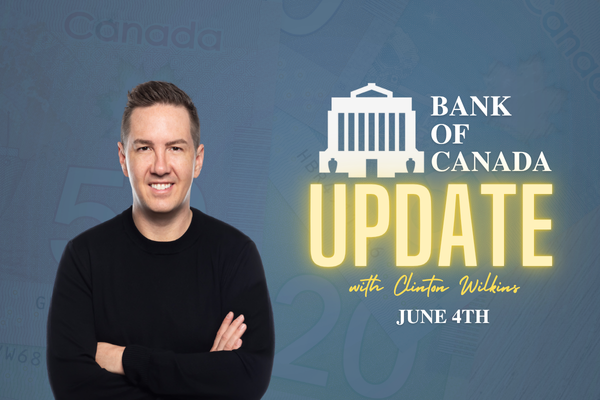Clinton Wilkins joins Todd Veinotte on 95.7 News Radio to discuss The Bank of Canada holding its key policy rate at 2.75%, marking the first pause after seven consecutive cuts.
Bank of Canada – fixed rates are still higher | June 1, 2022
Clinton chats with CityNews 95.7 host, Todd Veinotte about the Bank of Canada announcement. The Bank of Canada increased the key overnight rate by 50 basis points, and prime rate will now be 3.7 per cent for many lenders. Fixed rates are still higher than variable rates, we’re still at pre-pandemic rates, and we don’t think the rates will negatively impact our housing market like we are seeing across the country. So take a deep breath, and give us a call if you’re feeling uncertain about your situation.
Bank of Canada Announcement – June 1, 2022: Fixed rates are still higher
Don’t feel like watching the video? Check out the transcript below.
Transcript:
Bank of Canada prime rate at 3.7 per cent
Todd Veinotte: [00:00:00.06] Quickly, I wanted to chat with Clinton Wilkins about, we’re talking with the Bank of Canada raising its interest rate. So we bring Clinton in quickly here to get his take on all of this. He is of course, our mortgage guru. Clinton Wilkins, what does this mean for the average person out there, this hike?
Clinton Wilkins: [00:00:16.95] The average consumer that is in a variable rate mortgage product is going to see their payment increase or their amortization increase, Todd, with today’s announcement. Many lenders will increase today their prime rate by 50 basis points. Many lenders, their prime rate will now be 3.7 per cent. You know, there are some lenders who have a variable rate mortgage where the payment is fixed, but the amortization will now extend. So depending on which type of product you’re in, that will obviously make a difference.
Fixed rates are still higher than variable rates
Your previous caller mentioned that, you know, the government is not getting it right. And I think they’ve admitted that, Todd, and they made a very sharp comment today in today’s announcement saying that they will increase the rate more if they need to, to get the inflation in line. Inflation is a little bit of a runaway train that they’re trying to get under control.
But many economists are projecting that we’re going to be in a recession territory by the end of next year. So if you’re a consumer and you’re in a variable rate mortgage product or if you have a home equity line of credit or any other debts attached to a variable rate product, you’re going to see a change in your payment. Don’t stress out because the fixed rates today are also very high.
Clinton Wilkins: [00:01:36.09] Many consumers may consider changing or converting into a fixed rate, and we’re really discouraging consumers from doing that. Today, the same type of product in a five year fixed rate is anywhere between 4.5 And five per cent.
We’re still at pre-pandemic rates
So really what that means, Todd, the variable rate is still a great option and we are still at pre-pandemic pricing. Before the pandemic even struck, the prime rate was 3.95. So we’re below that. And one other comment about housing: We have some of the most affordable housing from across this country.
We’ve certainly seen some increases. I understand it’s very challenging for first-time home buyers, but the average home price in Halifax is about $500,000 and it’s some of the most affordable housing, you know, in Atlantic Canada compared to the rest of the country. So, you know, I think we’ve right sized our prices.
We don’t think the rates will negatively impact our housing market
I do not believe with today’s increase in the key overnight rate, it is going to negatively impact the house prices like we’re currently seeing in Ontario and in B.C. But I think we’re going to restabilize the market here a little bit, Todd. There certainly more listings out there. And you know, I think that coming into the summer, it’s going to be certainly an interesting time.
Todd Veinotte: [00:02:50.58] All right. So just generally, what are people looking at with this interest rate hike? If you’re if you’ve got a variable mortgage in the $500,000 range, just kind of ballpark, what’s that translate into a monthly or biweekly payment?
Clinton Wilkins: [00:03:03.24] On your amortisation, we’re probably you’re probably looking at around $100 or so, plus or minus increase in your cost of borrowing right now. So although that can be significant for some households, Todd.
I think we also mentioned consumer goods, fuel, groceries, those of all increased and in some cases they’ve increased significantly more than $100 a month. So, you know, we’re feeling pain kind of all across the spectrum. It’s not just the cost of borrowing. And the reason that they’re increasing this cost of borrowing is to get the cost of consumer goods back under control.
Canadians need to start saving
The Bank of Canada is trying to send a clear message to Canadians: stop spending. Start saving your money and that will then bring some of these supply chain issues back into, you know, a more reasonable situation. And we are going to see more increases, Todd, over the next 12 to 18 months. But the rates are not going to the moon. This is not the 1970s, 1980s.
We’re going to see some increases. Economists think that the prime rate is going to get to somewhere around 5 per cent. And then by the end of next year, we’re going to start seeing some softening in the rates and we’re going to get maybe back into a more normal situation. But with a recession comes other challenges around employment and all these things. So, you know, I think now is certainly a great time to look at your finances. And I think that every consumer really needs to look in the mirror.
You know, Nova Scotians, specifically in Halifax, if you owned a home pre-pandemic, you have a lot of equity in your home. It could be a great time to look at potentially refinancing to improve your situation, to make sure your financial household is in order kind of going forward, because we’re going to continue seeing consumer goods maybe become more expensive before inflation starts coming back in line.
Todd Veinotte: [00:04:56.91] Always great, Clinton. Thank you so much. Talk soon.
Clinton Wilkins: [00:04:59.97] Thanks for having me, Todd. Have a good day.
Todd Veinotte: [00:05:01.47] Alright, take care. Clinton Wilkins, our mortgage guru.
If you have any questions, get in touch with us at Clinton Wilkins Mortgage Team! You can call us at (902) 482-2770 or contact us here.


